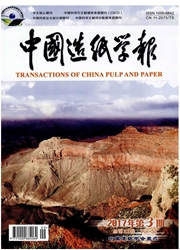

 中文摘要:
中文摘要:
纸浆过程流中可能存在对香豆酸、磺基水杨酸、水杨酸、柠檬酸4种作为广义螯合剂的木素溶解物,采用电位法和吸光光度法测定该4种模型物对Al^3+、Fe^3+、Cu^2+、Mn^2+、Mg^2+、Ca^2+金属离子的螯合平衡常数,并与传统螯合剂EDTA和DTPA进行比较,探讨纸浆过程流中螫合剂对金属离子的螯合竞争件和可能存在的螯合和脱螯合现象。结果表明,Al^3+和Fe^3+与模型物的螯合平衡常数最大,螯合能力最强;具链式结构的柠檬酸螯合各种金属元素的能力较强,对香豆酸与金属元素的螯合能力较弱;金属离子与螫合剂螯合时的配位数越高,形成的配位物越稳定;根据纸浆过程流中金属离子的特征和木素溶出物的结构特点,选择性地采用不同的螯合剂去除浆料中的金属元素可达到理想效果。
 英文摘要:
英文摘要:
The chelating equilibrium constants between Al^3+ , Fe^3+ , Cu^2+ , Ca^2+ , Mn^2+, Mg^2+ and the model compounds, p-coumaric acid, sulfosalicyie acid, salicyie acid, citric acid, which are the possible dissolved lignin fragments in pulp flow, were measured by using pH potentiometer and spectrophotometer. The results indicated that the chelating equilibrium constants between Al^3+, Fe^3+ and the model compounds are bigger than other metal ions, the chelated compounds are the most stable; the model compound which has a chain structure, such as citric acid, has a stronger ability to chelate with metal elements; the chelating ability of p-coumaric acid is weaker. The ideal chelating effect for removal of metal elements can be achieved by choosing different chelating reagent according to characters of metal elements and structures of dissolved lignin fragments.
 同期刊论文项目
同期刊论文项目
 同项目期刊论文
同项目期刊论文
 期刊信息
期刊信息
